This Couple Left Mumbai & Transformed Abandoned Land in Mahabaleshwar into a Zero-Waste Farm
What does it take to leave behind the noise, the rush, and the endless grind of city life, and choose instead the steady pulse of the land? For Neil and Momo, this was not just a question. It was a calling.
Located in the misty hills of Mahabaleshwar, their farm is a world apart from the hectic streets and towering offices they once knew. Here, mornings begin with the soft chorus of birdsong, not honking traffic. Days are shaped by the rising sun, the turning seasons, and the hands-on work of tending soil, trees, and animals. It is in this rugged beauty that Swapnil Rao and Mrunmayee Deshpande Rao, known to most as Neil and Momo, chose to build a new kind of life.
Neil’s path to this life began with a rigorous education in engineering, followed by business management. His city years were filled with building startups and strategic growth. “I was chasing success, but somehow I felt disconnected from people, purpose, and the world around me,” he tells The Better India.
On the other hand, Momo’s upbringing in Pune was woven with the colourful threads of art and culture. From childhood, she indulged in the world of theatre and film, pouring her heart into performances that captivated audiences and brought stories to life. Her success as an actor and director in the Marathi industry brought her recognition and the thrill of creative expression.
But beneath the applause and the bright lights, she felt a yearning that went beyond the stage. The fast pace of the entertainment world, with its relentless schedules and endless demands, left little room for stillness or introspection. She longed for a life uncluttered by noise, where she could find space to breathe freely and reconnect with something more enduring and true.
“It was not that I wanted to leave my passion behind,” she reflects, “but I needed to find balance, a life where creativity could flow naturally, alongside peace and simplicity.”
A meeting of minds (and hearts) online
Neil and Momo’s meeting in 2015, through a matrimonial website, brought these shared longings into focus. “We realised we wanted something different,” Momo recalls. “A life that was slower, more meaningful, and strongly connected to the earth.”
 Swapnil and Mrunmayee met through a matrimonial site and bonded over their interest in living a sustainable life
Swapnil and Mrunmayee met through a matrimonial site and bonded over their interest in living a sustainable life
So, they made the daring decision to walk away from the noise and pace of city life, not to escape, but to live in nature’s lap. The choice to move to the hills was not romanticised; it was the result of constant questioning, reflection, and a desire to reconnect with something real. Life on the land came with its share of challenges, like erratic weather, unfamiliar terrain, and the unrelenting demands of farm work. But each day brought them closer to understanding what they were looking for in this new way of life.
By 2019, those questions had become a clear vision. But they knew that desire alone was not enough. Neil enrolled in formal permaculture training, immersing himself in the principles of regenerative agriculture, learning how to design systems that restore soil health, conserve water, and support biodiversity.
Alongside this, the couple chose to live and work on farms run by friends and mentors, spending time in different rural settings to observe, ask questions, and understand the realities of land-based living. They took their time researching, listening, and learning at every step.
Choosing a broken piece of land on purpose
In 2020, they finally took the leap and sold everything they had in Mumbai and purchased a piece of land in Malusar, a small village tucked in monsoon-fed hills of Mahabaleshwar. But the land they chose was not a picture-perfect plot; it was barren in places, stripped of nutrients, and in need of healing. That is exactly why they chose it.
“We spent the whole of 2021 just observing,” the couple explains. “In the first year of shifting to the land, you are not supposed to touch anything; you just watch, listen, and try to understand what the land needs.”
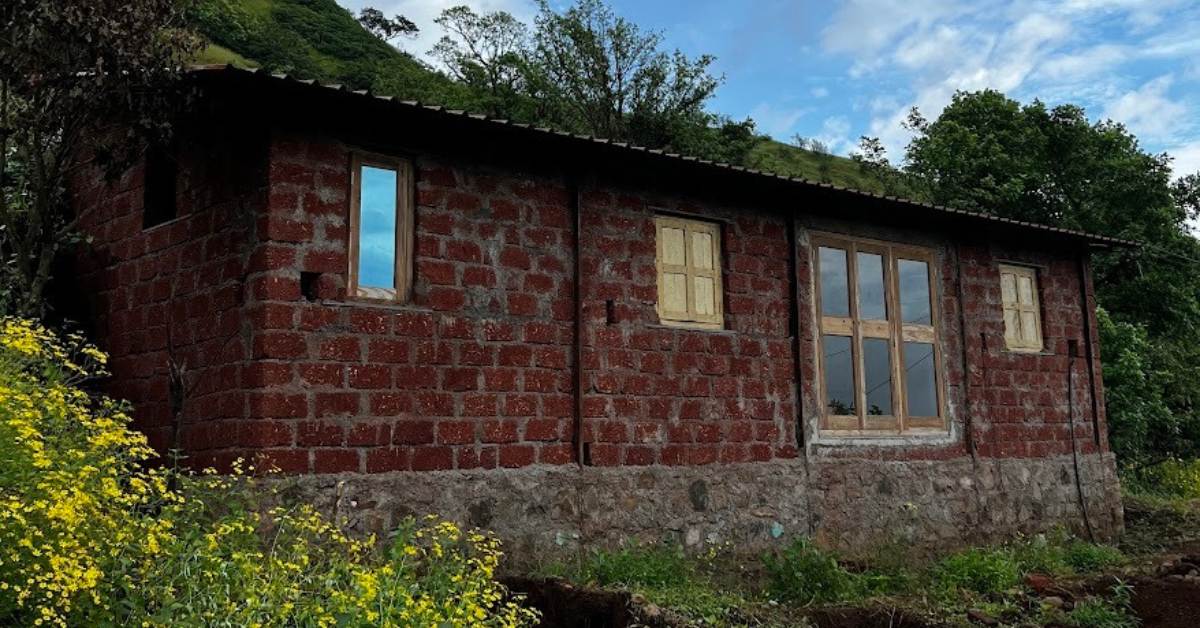 In 2020, the couple finally took the leap and sold everything they had in Mumbai and purchased a piece of land in Malusar
In 2020, the couple finally took the leap and sold everything they had in Mumbai and purchased a piece of land in Malusar
In 2022, they built a small one-room studio on the farm and began the work of establishing their food forest. “We wanted to move in quickly, so the house was designed to be simple but very scientific,” explains Neil. “Its alignment is east-west, which allows us to make the most of the natural wind flow to keep it cool.”
The materials they chose were rooted in the local landscape. “There is no plaster on the outside; the walls are made of laterite, a native Mahabaleshwar stone. Inside, we avoided cement completely and used lime instead. We built the entire house ourselves, just the two of us, with our own hands,” says Momo.
Their home is entirely solar-powered. “We are net zero in terms of electricity,” they explain. “It is a tiny house, so it does not take up too much space, and everything was designed using passive solar principles,” she adds.
Rainwater harvesting plays a crucial role. “All the runoff from the roof is captured and stored in tanks, then directed to irrigate the food forest,” her husband says. Even wastewater is carefully managed. “Our greywater, from the bath and kitchen sink, passes through reed beds, where it is naturally filtered, and then it goes to water our banana plants,” he explains.
Nothing goes to waste. “We compost all our kitchen scraps and return them to the farm. Everything stays within the system,” they say.
Let nature lead: Planting a food forest
Their mission was to restore the land using permaculture practices, to let nature lead the way, and to enhance the space into an abundant farm where food, creativity, and care could flourish side by side. Their long-term vision extended beyond just growing their own food; they wanted to build a model of living that honoured the environment, supported the local community, and inspired a soulful way of being.
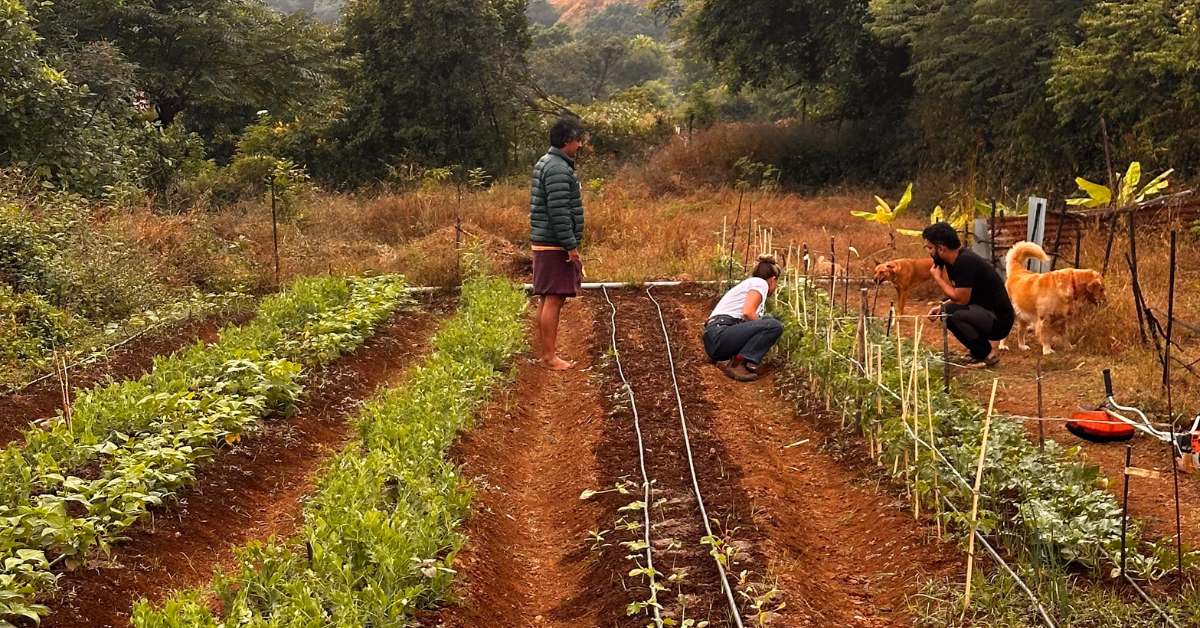 Neil and Momo wanted to restore the land using permaculture practices, to let nature lead the way
Neil and Momo wanted to restore the land using permaculture practices, to let nature lead the way
Today, the couple’s days unfold in sync with the land. They grow what they eat, collect their own seeds, and craft with their hands. Neil and Momo’s farm is no ordinary piece of land. It is a carefully designed, regenerative ecosystem where every element, from the soil to the plants to the wildlife, is part of this symbiotic relationship. Their approach is influenced by permaculture, an agricultural design system based on natural ecosystems.
“Permaculture is about working with nature, not fighting it,” Neil explains. “We focus on creating a self-sustaining system that nurtures the soil, supports biodiversity, and produces food and resources without harm.”
Over five years, they changed three acres of degraded land into a lush farm. Through composting, cover cropping, mulching, and planting a diversity of crops and trees, they added over 30 tonnes of organic matter to the soil. This increased the soil’s organic carbon content, an essential factor for long-term carbon sequestration and soil health, by approximately half to one percent.
“Watching the soil come back to life has been the most rewarding part,” Momo says. “The earth is resilient when you treat it with respect.”
Their farm grows a wide variety of vegetables, fruits, and native plants. Leafy greens like spinach, kale, fenugreek, and mustard grow alongside cruciferous vegetables such as cabbage, cauliflower, and broccoli. Root vegetables include carrots in orange, red, and black varieties, beets, and potatoes. The farm also boasts gourds like ridge gourd, bottle gourd, snake gourd, and ash gourd, as well as nightshades such as heirloom tomatoes, brinjals of different varieties, and chillies.
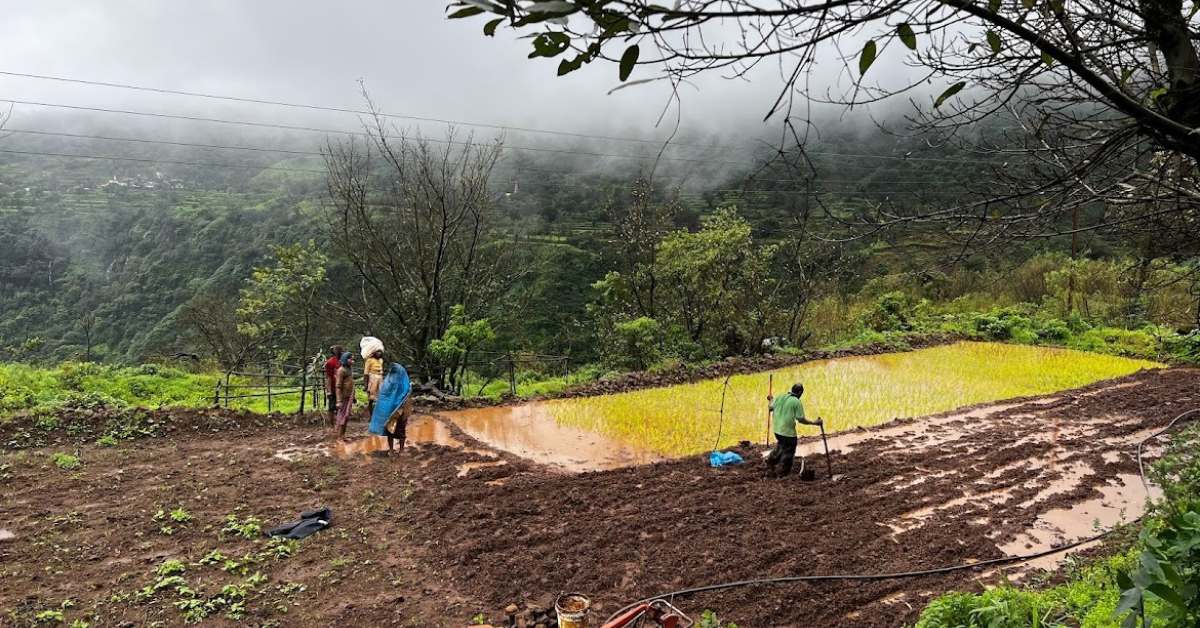 The process of permaculture helped to bring the barren land back to life
The process of permaculture helped to bring the barren land back to life
Beans and legumes, including French beans, cluster beans (gawar), and edamame, add to the diversity, as do fast-growing greens like malabar spinach and water spinach. The roots and tubers section features taro (arbi), elephant foot yam (suran), turmeric, ginger, and sweet potatoes. They also grow native trees of the Mahabaleshwar bio-region, preserving local biodiversity.
Among fruits and spices, the farm produces lychee, mango, coconut, jackfruit, nutmeg, cinnamon, guava, avocado, and several local delicacies such as jamun, awla, breadfruit, kokum, and the unique kusum tree. Their dedication to native species also supports over 40 native bird species, pollinators, frogs, and beneficial insects.
How nature became skincare
The farm’s bounty does not end with fresh produce. Drawing inspiration from the land’s richness and their passion for natural living, the couple developed a line of handmade soaps and personal wellness products that capture the essence of their farm’s ethos. Their organic brand, ‘Neil & Momo,’ offers a range of eco-conscious and artisanal products, including bath bars, shampoo and conditioner bars, solid deodorants, bamboo toothbrushes, dishwash and fragrance bars, along with their signature farm-to-jar strawberry preserve and wild forest honey.
“Our soaps are more than just cleansing bars,” Momo explains. “They are a bridge between nature and daily life, crafted with intention and respect.”
Each bar is made using the traditional cold process method, a time-honoured technique that retains natural glycerin and preserves the delicate properties of plant oils without artificial hardeners. Every batch is small and carefully hand-poured, hand-cut, and cured over four to six weeks, guaranteeing quality and consistency.
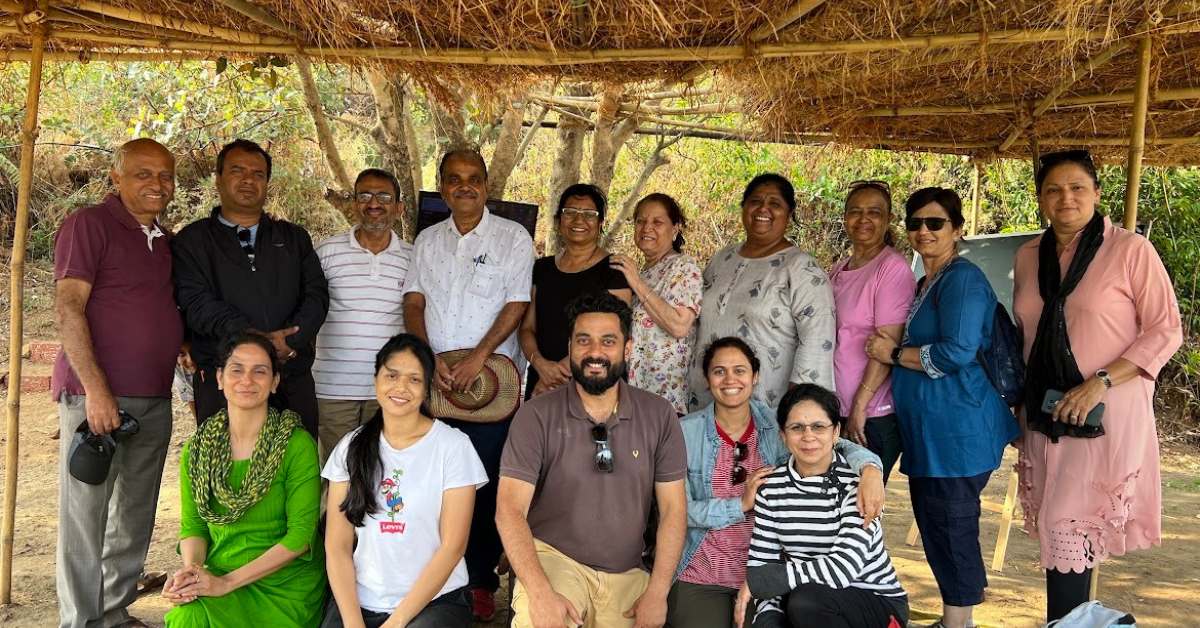 Neil and Momo also teach others about how they can start permaculture farming and grow their own food forest
Neil and Momo also teach others about how they can start permaculture farming and grow their own food forest
The base oils are a thoughtfully selected blend of cold-pressed and plant-derived oils sourced from ethical farming communities across India that practice regenerative methods. These oils are celebrated for their cleansing, moisturising, and nourishing effects on the skin. The soaps create a rich and gentle lather that leaves skin hydrated and balanced.
The fragrances in the soaps come from pure, steam-distilled essential oils or fragrance oils blended with 100 percent natural bases, including essential oil isolates, natural resins, and botanically derived compounds. Free from parabens, phthalates, synthetic preservatives, and harsh chemicals, each scent is designed to evoke the rhythms of farm life, whether it’s the fresh crispness of a morning walk through the forest, the earthiness after rain, or calming herbal notes.
“We want every scent to connect you to a moment in nature,” says Neil. “The oils we choose are not just about fragrance, they have therapeutic benefits too, like uplifting your mood, calming the mind, or clarifying your senses.”
Some soap bars include botanical additions grown or foraged right on their farm. Herbs, flowers, and clays add gentle exfoliation, subtle colour, and texture, while creating a direct connection to the land where they were born.
 Their organic brand, ‘Neil & Momo,’ offers a range of eco-conscious and artisanal products, including bath bars
Their organic brand, ‘Neil & Momo,’ offers a range of eco-conscious and artisanal products, including bath bars
Sustainability extends to packaging as well. All soaps are wrapped in biodegradable, recycled, or handmade paper, with labels that are simple, compostable, and hand-applied. “Zero plastic, always,” Momo emphasises. Each batch is date-stamped and traceable, reflecting their commitment to transparency and low-waste living.
Their Aloe Lavender Shampoo Bar, made with organically extracted aloe gel and natural coconut surfactants, offers a luxurious hair spa experience, free from synthetic detergents and preservatives.
The sweet story of their honey
Their Wild Forest Honey is another treasure, harvested from the biodiverse forests of Mahabaleshwar. This raw and unfiltered honey supports local communities and the delicate balance of the forest ecosystem. “Buying our honey means you are supporting ethical harvesting practices and the conservation of native forests,” the husband points out.
The couple’s passion for permaculture goes beyond their farm. Since 2023, they have been hosting immersive three-day “Introduction to Permaculture” workshops, blending theory with hands-on learning to offer a rich and practical experience to interested visitors. These workshops welcome individuals from all backgrounds, farmers, urban dwellers, students, and sustainability enthusiasts alike.
Over 150 participants have taken part in these workshops until now, travelling from various parts of India and even abroad. The response has been positive, with many attendees returning for advanced sessions or inviting the couple to conduct customised workshops.
 The fragrances in the soaps come from pure, steam-distilled essential oils or fragrance oils
The fragrances in the soaps come from pure, steam-distilled essential oils or fragrance oils
The workshops cost Rs 15,000 per participant, covering all sessions, materials, site visits, and meals made from farm-fresh ingredients. The fee supports the farm’s operational costs and helps fund community outreach programmes.
The workshop experience: From forest walks to life audits
Each workshop begins with forest walks to introduce participants to the native ecosystem, followed by classroom sessions on permaculture ethics and design principles. Participants learn to observe natural patterns, map contours, test soil health, and design water harvesting systems. Practical activities include seed starting, compost making, and building soil fertility.
“We then gather for an open discussion, where we reflect on each person’s lifestyle and conduct a simple life audit,” explains Neil. The goal is to help everyone identify small and practical steps they can take to begin managing and reducing their waste immediately.
After the workshop and reflection session, visitors are treated to a wholesome farm-to-table meal. The food served is a traditional Maharashtrian meal, usually featuring two seasonal vegetable dishes, freshly made rotis, rice, and dal. Most of the ingredients used in the meal come directly from the farm itself. The rice and vegetables are grown on-site, while the wheat used for the rotis is sourced from a neighbouring farm.
This meal often becomes one of the most impactful parts of the experience. Many visitors find it life-changing because the food is grown without the use of chemicals and prepared with care. Eating this kind of fresh, natural food can make people more aware of how their bodies respond to what they consume.
“We believe in empowering others to become caretakers of their land, whether that is a backyard garden or a larger farm,” the husband shares. “These workshops are seeds that grow beyond our farm, spreading regenerative practices across communities.”
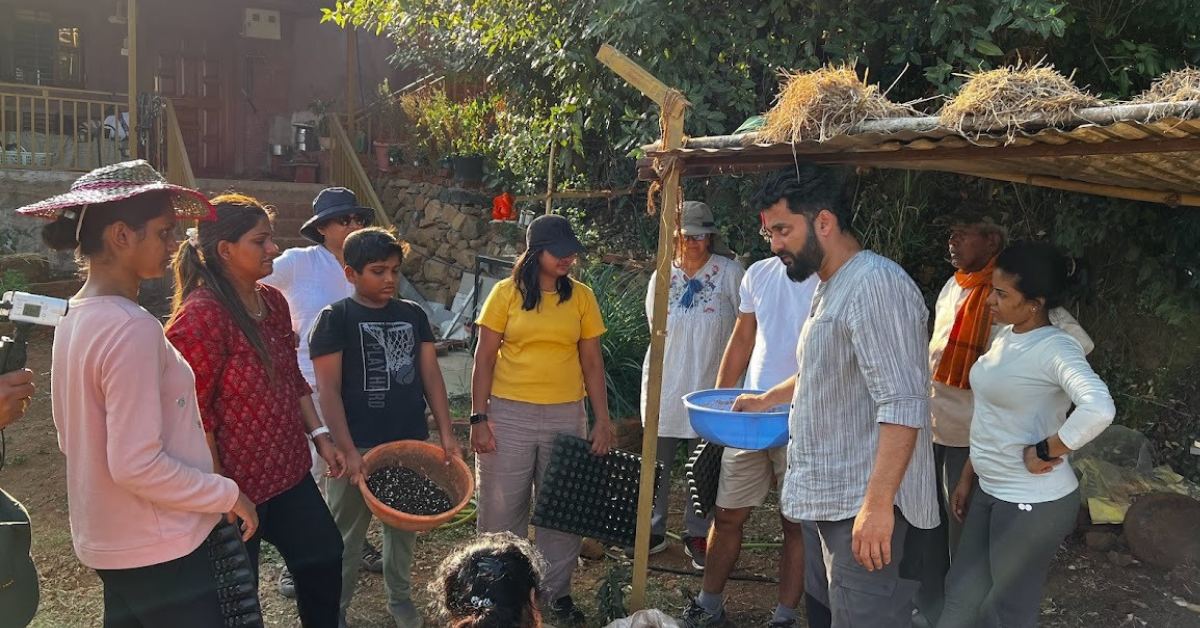 Since 2023, the couple has been hosting immersive three-day “Introduction to Permaculture” workshops for interested visitors
Since 2023, the couple has been hosting immersive three-day “Introduction to Permaculture” workshops for interested visitors
Srushti Gosavi, 26, a homoeopathic practitioner from Nashik, says, “For the past few years, I have been drawn towards a more natural and conscious way of living, largely because I have felt the weight of climate change and its impact on our lives and health. The idea of permaculture fascinated me from the moment I first heard about it, and, thanks to the Instagram algorithm, I stumbled upon Neil & Momo’s page while searching for sustainability content. I have been following them since the very beginning.”
“I finally made it to their March workshop, and it felt like stepping into a space I had been searching for. The experience was full of insight on sustainable practices and the people were curious, kind, and had similar thought processes, thus making it even more special. One of the most memorable moments for me was learning about how roots connect underground and how soil functions much like the human body. As someone trained in homoeopathy, that parallel was incredibly exciting. And yes, I dug my hands into cow dung for the first time, and absolutely loved it,” she adds.
One of the most impactful moments during the workshop was a life cycle analysis (LCA) activity, which revealed the hidden environmental cost of everyday consumer habits. “It really hit me, I uninstalled all my e-commerce apps while still on the farm, and have not felt the urge to go back,” she shares.
Goodbye apps, hello conscious living
Since the workshop, Srushti has begun planning a green space of her own, with native trees, birds, and a small food-growing area. A chance connection with a native plant expert at the farm helped her finally convince her parents that native plants can be beautiful too.
Shamika Bhide, a 31-year-old playback singer based in Mumbai, attended the permaculture workshop with her husband after watching one of Neil & Momo’s interviews online. “We had been following them for a while, but that interview really struck a chord; we did not just want to admire what they were doing, we wanted to understand it,” she says.
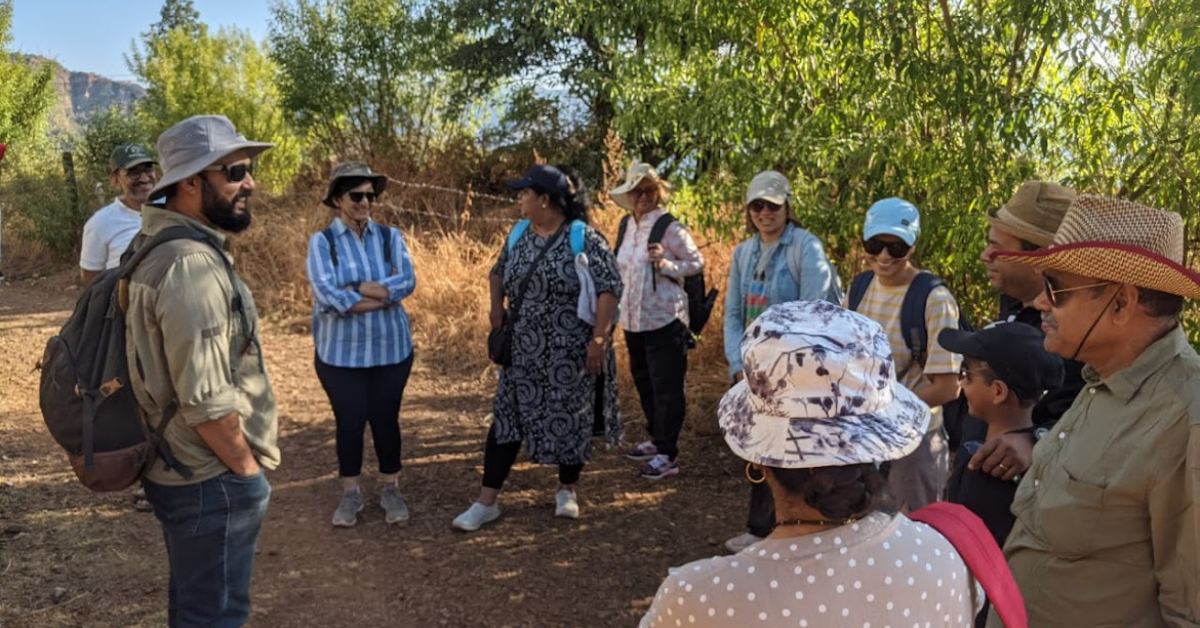 The workshops cost Rs 15,000 per participant, covering all sessions, materials, site visits, and meals made from farm-fresh ingredients
The workshops cost Rs 15,000 per participant, covering all sessions, materials, site visits, and meals made from farm-fresh ingredients
The factor that resonated most with her was how integrated the learning was. “Everything we discussed in the theory sessions was already alive and implemented on the farm. It was not abstract; it was right there in front of us. The farm tour made everything click. We finally understood what it means to design with nature, not against it,” she adds.
Back in Mumbai, that clarity began to shift their everyday choices. “We stopped relying on delivery apps and began sourcing our food from local farmers’ markets. We also replaced chemical-heavy products with natural alternatives and even started a small kitchen garden,” she explains.
The workshop gave them the confidence to think long-term. “We are now seriously considering buying a piece of land where we can apply these principles. We have also started talking to friends and colleagues about sustainability, not by preaching, just by sharing what has changed for us,” she says.
For Shamika, the biggest realisation was, “Permaculture is not only about growing food, it is a mindset. It is a lens through which you can reimagine how you live, what you consume, and how you connect with the world around you.”
Real changes take place slowly and steadily
The story of Neil & Momo is also one of measurable environmental success. When they first arrived in the hills of Mahabaleshwar, the earth beneath their feet was dry, compacted, and stripped of life. The topsoil had eroded from years of conventional agriculture, and very little could grow without heavy chemical inputs. But rather than turn away, they saw possibility.
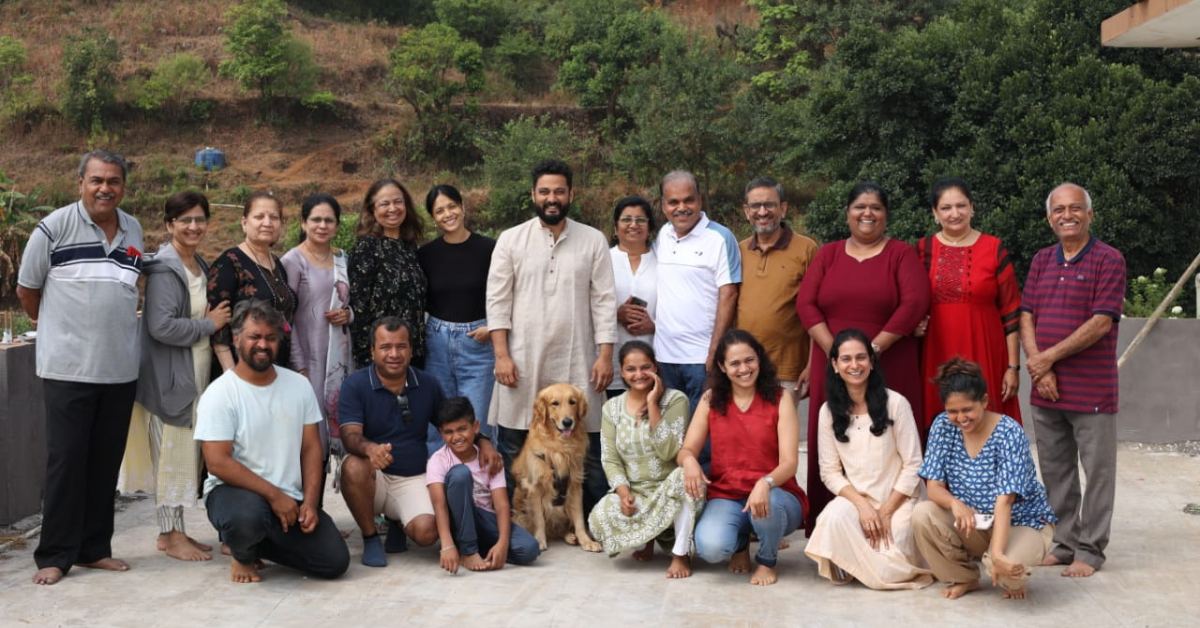 The couple helps people understand how they can also start living a zero-waste life in the city by making small changes
The couple helps people understand how they can also start living a zero-waste life in the city by making small changes
By adopting a zero-landfill lifestyle, the couple has composted over 3,000 kilograms of organic waste, from both the farm and their home, diverting it from landfills and turning it into nourishment for the earth. All greywater from their household is treated and redirected into the fields, helping them save more than 50,000 litres of fresh water over five years.
Their commitment to a low-impact lifestyle also meant embracing renewable energy. Their home runs on solar-powered drying, heating, and cooking systems, and the design of their living spaces relies entirely on passive cooling, no air-conditioners, and no energy-hungry machines. Transport is kept minimal, with most errands done on foot or through coordinated, shared logistics. There is a 70 percent reduction in household carbon emissions compared to the urban average.
They have also kept more than 3,500 plastic bottles out of circulation by refusing plastic-packaged personal care products.
And then there is the revival of biodiversity. More than 500 trees and perennials, including fruit trees, medicinal plants, nitrogen-fixers, and native forest species, have been planted across the land. As the ecosystem rebalanced itself, it welcomed back birds, frogs, butterflies, and bees.
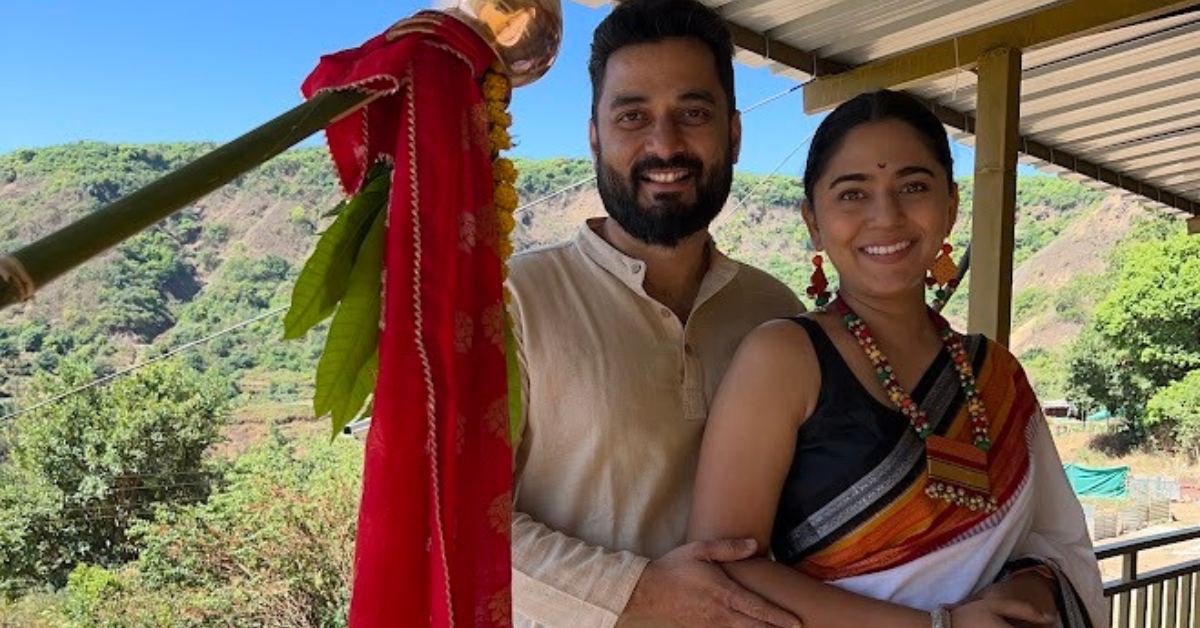 The couple has planted more than 500 trees and perennials, including fruit trees, medicinal plants, nitrogen-fixers, and native forest species
The couple has planted more than 500 trees and perennials, including fruit trees, medicinal plants, nitrogen-fixers, and native forest species
“When the land sings back to you, when the frogs croak at night and the birds greet you in the morning, that is when you know the work is real,” Momo reflects.
For the duo, everything comes down to one principle: that well-being grows in direct proportion to our closeness to nature. Neil & Momo’s story is an invitation. It asks each of us to rethink our relationship with the earth and the choices we make every day. From the food on our plates to the soaps in our bathrooms, every decision is an opportunity to support restorative living. Whether you visit their farm, join a workshop, or bring home one of their handmade products, you become part of a community dedicated to sustainability, authenticity, and care.
All pictures courtesy Swapnil Rao
News